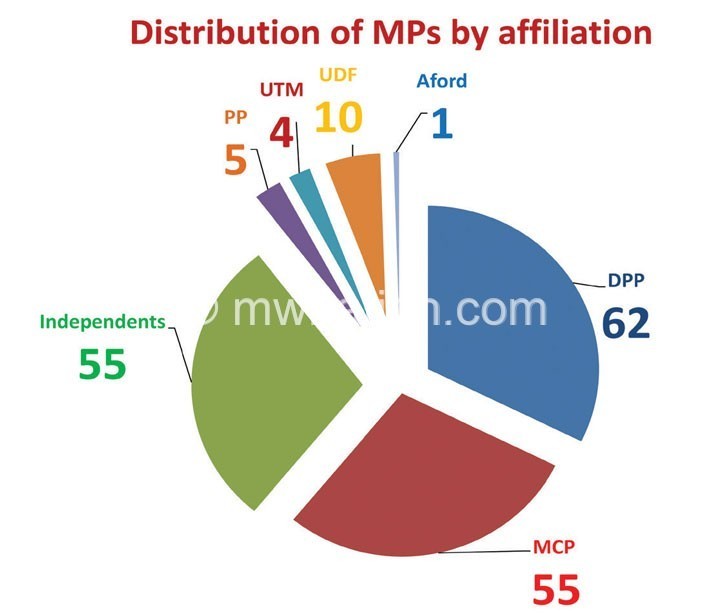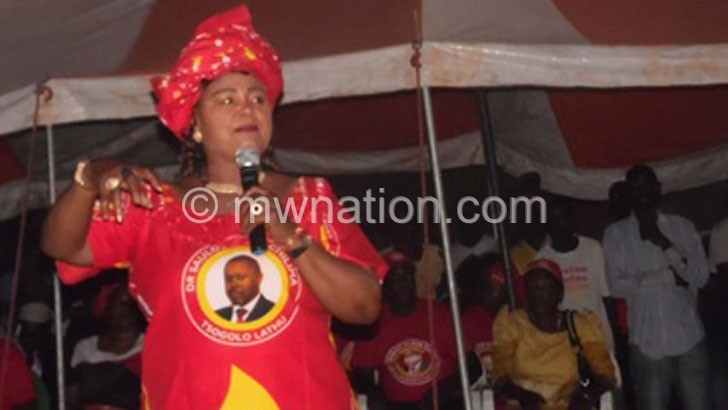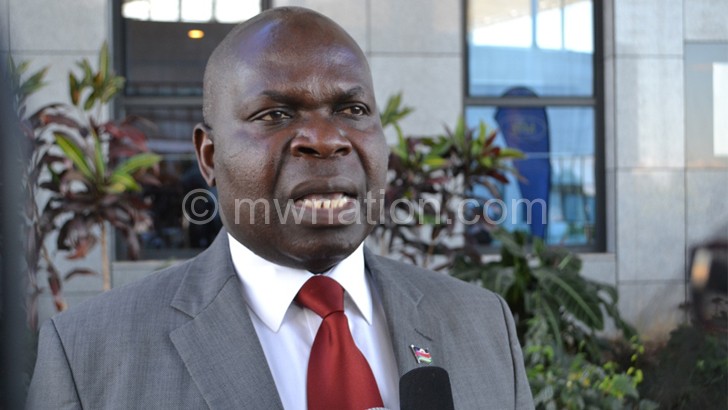No party gets majority MPs in Parliament
The results the Malawi Electoral Commission (MEC) announced on Saturday at the national tally centre in Blantyre showed that whichever party wins the presidency will not have majority in Parliament.
Giving the electoral update at around 7 pm on Saturday in a jam-packed Comesa Hall, the commission’s chairperson Jane Ansah said the presidential results will be announced in due course—owing to a court order Malawi Congress Party (MCP) obtained against release of results of the presidential vote—but proceeded to release the parliamentary results.

She gave results from 192 constituencies out of 193, except Lilongwe South where voting did not take place following the death of UTM aspirant Agnes Penemulungu.
From the results announced, it was clear that no party has a majority of MPs in the 193-member august House. Democratic Progressive Party (DPP) has won 62 MPs, which is an increase of 12 MPs from 2014 when the party got 50. Likewise, MCP has recorded an increase of seven MPs, from 48 in 2014 to 55.
This number is the same as that of independents which has also increased with one MP, at 55 during these elections from 54 in 2014.

For the UDF, however, their numbers have plummeted from 14 in 2014 to 10. This is the same fate that has befallen People’s Party (PP), that has shrunk from 26 MPs in 2014 to five this year.
The new kid on the political scene, UTM has got four MPs, with Alliance for Democracy (Aford) maintaining the single seat they got last time.
In terms of gender, there is an increase of 11 female MPs from 32 in 2014 to 43.

Speaking to Nation on Sunday, the 50:50 Campaign Agency communications expert Wisdom Chimgwede expressed satisfaction with the performance of the female aspirants.
“What is key is that we have passed the baseline of 32 MPs who were in recent past Parliament,” he said.
However, NGO Gender Coordination Network chairperson Barbara Banda said it was sad that more former female MPs have not made it back to Parliament.
“Our analysis is painting a clear picture of increasing number of new female entrants into the National Assembly. Nevertheless, we acknowledge that this addition could have been more impactful if it was complemented with a good percentage of retained female MPs,” she said.
Commenting on the results, Chancellor College political scientist Ernest Thindwa said it was expected that no party would get majority numbers in Parliament.
“This is because in our electoral system of first-past-the-post you tend to have only two parties with numbers as people stop voting for small parties as they feel they cannot win. This was the case with the North, where Aford that was strong in 1994 is now reduced to one MP.
“The same has happened in the Eastern Region, where UDF supporters might have voted in large numbers for the DPP,” he said.
On the need for the winning party to form a political alliance in Parliament to have a majority, Thindwa opined that it will not be necessary unless the ruling party would want to push less popular policies.
“But our democracy lacks clear ideologies. You have parties with similar policies so parliamentary alliances won’t be needed,” he explained.
On the increasing numbers of independents, Thindwa said it was a result of parties failing to manage primary elections in which parties imposed candidates on the people.
“Second, this shows that people are losing faith in parties, so they are voting for individuals that they can relate with well,” he said.
Parliament, however, will see many new entrants, following the fall of political heavyweights some of whom had been in the House since the advent of democracy in 1994 such as Salima South former MP Uladi Musa and Mangochi East former MP Abubaker M’baya.
The number of casualties includes Mulanje West former MP Patricia Kaliati who is UTM secretary general, former ministers Henry Mussa, Everton Chimulirenji, Jean Kalirani and Emmanuel Fabiano.





